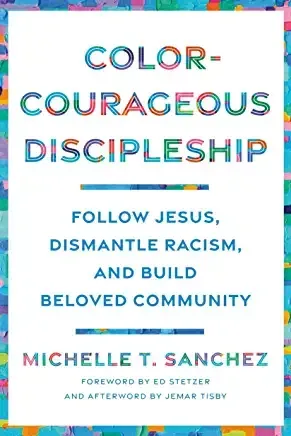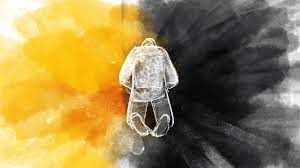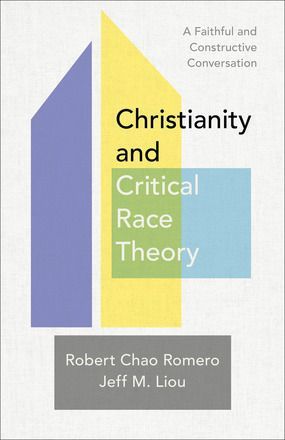Book Review of Color Courageous Discipleship
Josh Cramer • March 18, 2023
This is a subtitle for your new post

In Color Courageous Discipleship: Follow Jesus, Dismantle Racism, and Build Beloved Community, Michelle Sanchez, Executive Director of Make and Deepen Disciples for our own Evangelical Covenant Church, has given us a resource for integrating two journeys that have often felt disconnected. For Christians who want to love and follow Jesus, personal discipleship and church community may take priority over the social or political work of fighting racism. I’m called to life in Jesus—what does battling America’s racist structures have to do with him? And while we might be able to come up with theological answers to that question, we can often struggle to make the battle against racism a priority when our need for healing and community are so deep. For Christians who hear the invitation for the church to get involved in the work for racial justice, standing up for justice can be in tension with the inner healing and spiritual formation that we all need. I’m doing Kingdom work—what does it matter if my relationship with Jesus is shallow or I’m stretched thin? We might know in concept that we ought to care about our formation, but the work is so important!
There are several resources available that point to the need for Jesus followers to care about justice and others that demonstrate how activists need deep inner work, but what Sanchez does in Color Courageous Discipleship helpfully gives us vision for how both work together. For American Christians living in this time and place, discipleship and the battle against racism cannot be separated. This is an integrated journey, with vision and resources that build on one another.
Sanchez structures the book in three parts, moving from invitation to practices. In Part One, she invites and offers vision for a journey with Jesus that sees antiracism as central, not an add-on. In Part Two, she deconstructs the old paradigm that separated discipleship and racial justice and presents us with a new paradigm that integrates the two. In Part Three, she gives practices and habits that shape us in this new integrated direction as Jesus-centered antiracists. Along the way, Sanchez helps us to redefine ideas that have gotten in our way: true Christian discipleship is not an individualist notion, where my relationship with Jesus is all that matters and I might understand social justice as work for politicians, or even as antithetical to the gospel; at the same time, redeemed antiracism is not a project for atheist activists, where my justice work involves deciding that Bible and church are inherently racist. Sanchez argues for a restored vision of antiracist discipleship, where both concepts are redeemed in the Kingdom of Jesus.
This kind of book might have been inaccessibly academic. It’s deeply researched, but not unapproachable. Sanchez is clear, accessible, and welcoming, which matches her gracious and hospitable personality. She gives hard truths gently. (I have a friend and colleague who we know as “the Velvet Hammer”, a label that would equally apply to Sanchez.) Let me give three examples of the way that Sanchez weaves serious reflection with hospitable writing: her scholarship, the interviews, and her personal sharing. First, the scholarship: she is interacting with the best and most serious scholarship in various fields—including discipleship, antiracism, biblical scholarship, spiritual formation, sociology, and literature on shame—to offer a vision for antiracist discipleship. She quotes Kendi and Tisby, Nouwen and Bonhoeffer, Wright and Rah. Color Courageous Discipleship
has heft and depth. But her writing is so clear and welcoming that it never feels overwhelming. The title concept, “Color Courageous Discipleship”, fits within a long and ongoing scholarly tradition working toward racial reconciliation while being accessible. She wants to move us beyond the concept of colorblindness in our reconciliation work; “color courageous” casts vision in a clear way while standing within the broader conversation.
Second, the interviews at the end of each chapter bring in some of the best voices doing the best kind of integrated discipleship and justice work, national names and local pastors and denominational leaders. These interviews are helpful for demonstrating how well-known figures, like Esau McCaulley or Eugene Cho, fit with Sanchez’s vision and for introducing a broader audience to figures whose work is just as important but less well-known, like ECC denominational leader Greg Yee (Greg is the Superintendent of the Pacific Northwest Conference of the ECC, our denomination and conference; Greg is a great leader and a blessing of a human being). The interviews give us personal examples of what Sanchez is inviting us into—this is human and on-the-ground work.
Third, Sanchez shares her personal journey, sometimes very vulnerably. The story she shares at the beginning of chapter 2 (I’ll let you read it) told me that this book is not Sanchez scolding readers, or inviting us to a level she has reached but the rest of us can’t ever hope to. She is doing the work, too, and showing us resources and ways forward that have challenged and matured her. And the work God has done in her life is deep, and she hopes it will go deep in us.
I hope it’s obvious that I’m a fan. I think Sanchez is an incredibly gifted leader and has offered us a great gift with Color Courageous Discipleship. I hope that churches will use it for their discipleship pathways and will cultivate beloved community. We plan to read it together and discuss at RCB, looking for opportunities to orient our Jesus-following toward the Kingdom, where God produces integrated disciples who follow Jesus in overcoming ethnic division and reconciles divided people and communities. May our Lord, the Jewish carpenter killed by the oppressive empire in first-century Palestine, use Sanchez and her work to build his church into the beloved community that he wants us to become, for his glory and for the good of the world he loves!

This is how I remember Lent as a kid: go to mass on Ash Wednesday (I have no memory of any sermon, lol), vow to give up something (that lasted as long as a New Year’s resolution), and eat Long John Silver’s fried fish on Fridays (their hushpuppies and crunchies…mmmm). We didn’t eat meat on Fridays (unless we forgot, but we prayed, so it was ok); it was something everyone in the church did, right? I knew it was leading up to Easter--other than that, I had no real understanding or connection to it. Lent was taught more like an obligation rather than an opportunity. An opportunity to reflect, rejoice, rest, repent (what other “r” words can we think of?) on Christ’s journey to the cross. The next 40 days is an opportunity, an invitation to draw closer to the Giver of Life. For some, this might look sacrificial (giving something up), for others it might be a genesis (starting something new), or it can be a combination of the two. “Your kingdom come, Your will be done, On earth, As it is in heaven” Our Lord doesn’t just teach us to pray, he embodies prayer. He inaugurates God’s kingdom on earth through his presence with us; through his faithful obedience, we get to see and experience heaven on earth. This does not come without temptation, and trials, and wandering astray at times—yet our loving God invites. He invites us to remember, to reengage with the One who creates and holds all things; He invites us to lay down our lives and pick up our crosses. We want to invite you to participate with RCB, as we journey with Christ to Calvary, praying for the strength to be obedient… Your kingdom come, Your will be done, On earth, As it is in heaven.









